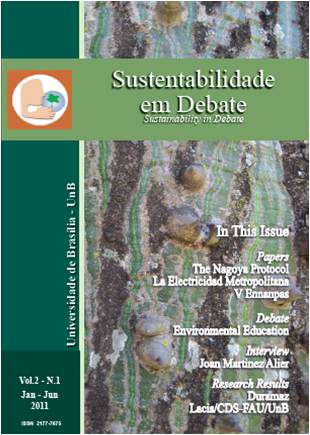The Nagoya Protocol on the use of genetic resources:
one embodiment of an endless discussion
DOI:
https://doi.org/10.18472/SustDeb.v2n1.2011.3906Palavras-chave:
Recursos genéticos, Acesso e Repartição de Benefícios, BiodiplomaciaResumo
O objetivo deste artigo é destacar o processo de negociação do Protocolo de Nagoya sobre a utilização dos recursos genéticos, adotado em outubro de 2010. Ao abordar os mitos e realidades associados à exploração da biodiversidade em uma perspectiva mais ampla, busca-se discutir como e por que os argumentos utilizados por países desenvolvidos e em desenvolvimento foram finalmente conciliados, resultando em um novo quadro jurídico internacional. O artigo demonstra em que medida este Protocolo permite aplicar o disposto na Convenção sobre a Diversidade Biológica de forma coerente `à legislação internacional pertinente (por exemplo, referente à propriedade intelectual). Também pretende avaliar se o protocolo permitirá reduzir a sempre existente lacuna entre os conceitos jurídicos construídos pela «biodiplomacia» e as necessidades reais e práticas de cientistas e empresas. Por último, procura estimar o impacto deste documento e sua aplicação sobre as estruturas já existentes, com foco na experiência brasileira.
Referências
BOISVERT Valérie (dir.). Les marchés de la
biodiversité. Paris: Éditions de l’IRD, 2007. 269
p.
Earth Negotiations Bulletin, Summary of the
Tenth Conference of the Parties to the
Convention on Biological Diversity: 18-29
October 2010, Vol. 9 n° 5442, Monday, 1
November 2010/ http://www.iisd.ca/bioidv/
cop10/
ETC GROUP. The New Biomassters -
Synthetic Biology and The Next Assault on Biodiversity and Livelihoods; Geopiracy: The
Case Against Geoengineering, new report.
2010. http://www.etcgroup.org/en/node/5229
FILOCHE Geoffroy. Les connaissances,
innovations et pratiques traditionnelles en
matière de biodiversité : un kaléidoscope
juridique. Droit et Société, n° 72 (2), 2009. pp.
433-456.
SECRETARIAT OF THE CONVENTION ON
BIOLOGICAL DIVERSITY. Global
Biodiversity Outlook 3 (GBO-3). Montreal,
2010. 94 p. http://gbo3.cbd.int/
UNEP/CDB/COP/DEC/X/, Nagoya Protocol on
Access to Genetic Resources and the Fair and
Equitable Sharing of Benefits Arising from
their utilization, 2010, 25 p. http://www.cbd.int/
nagoya/outcomes/
Downloads
Publicado
Edição
Seção
Licença
Copyright (c) 2011 Sustentabilidade em Debate

Este trabalho está licenciado sob uma licença Creative Commons Attribution-NonCommercial-NoDerivatives 4.0 International License.
A submissão de trabalho(s) científico(s) original(is) pelos autores, na qualidade de titulares do direito de autor do(s) texto(s) enviado(s) ao periódico, nos termos da Lei 9.610/98, implica na cessão de direitos autorais de publicação impressa e/ou digital à Revista Sustentabilidade em Debate do(s) artigo(s) aprovado(s) para fins da publicação, em um único número da Revista, autorizando-se, ainda, que o(s) trabalho(s) científico(s) aprovado(s) seja(m) divulgado(s) gratuitamente, sem qualquer tipo de ressarcimento a título de direitos autorais, por meio do site da Revista, para fins de leitura, impressão e/ou download do arquivo do texto, a partir da data de aceitação para fins de publicação. Portanto, os autores ao procederem a submissão do(s) artigo(s) Revista, e, por conseguinte, a cessão gratuita dos direitos autorais relacionados ao trabalho científico enviado, têm plena ciência de que não serão remunerados pela publicação do(s) artigo(s) no periódico.
A Revista encontra-se licenciada sob uma Licença Creative Commons Atribuição-NãoComercial-SemDerivações (Proibição de Realização de Obras Derivadas) 3.0 Brasil, para fins de difusão do conhecimento científico, conforme indicado no sítio da publicação, que permite o compartilhamento do texto e o reconhecimento de sua autoria e publicação original nesta revista.
Os autores têm permissão para assumir contratos adicionais separadamente, para distribuição não-exclusiva dos trabalhos publicados na Revista Sustentabilidade em Debate (por exemplo, em um capítulo de livro), desde que seja assinalado que os textos foram originalmente publicados nesta revista e que seja mencionado o DOI correspondente. Os autores têm permissão e são estimulados a publicar e distribuir o seu texto online, após a publicação (por exemplo, em repositórios institucionais ou nas suas páginas pessoais).
Os autores declaram expressamente concordar com os termos da presente Declaração de Direito Autoral, que se aplicará a submissão caso seja publicada por esta Revista.









